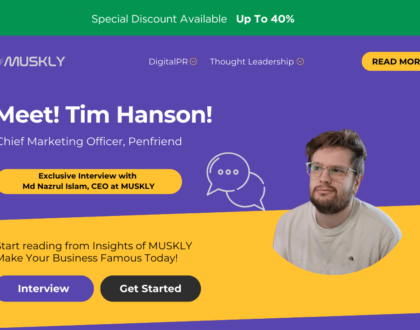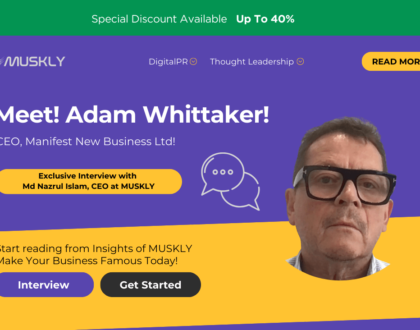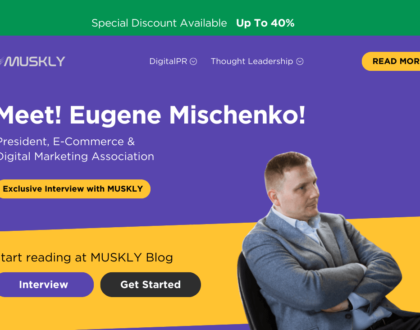Apps That Mean You Can Work From Anywhere In The World!

by MUSKLY
The ability to work remotely has never been more important. Whether you’re a freelancer, digital nomad, or part of a distributed team, having the right tools at your disposal can make all the difference in your productivity and success.
Ethan Bennet from Sonin shares his expert insights on the essential app categories that will empower you to work from anywhere in the world.
Communication Apps
Slack
Ethan says, ‘Slack is a messaging app for teams, allowing real-time communication and collaboration. Slack keeps remote teams connected and organized with features like channels, direct messaging, and file sharing.
Microsoft Teams
Microsoft Teams is a comprehensive communication platform that integrates with other Microsoft Office apps. It offers chat, video conferencing, file sharing, and project management tools, making it an excellent choice for remote teams.
Zoom
Zoom is a leading video conferencing and virtual meeting platform that enables remote teams to connect and collaborate in real time. ‘With features like screen sharing, breakout rooms, and recording, Zoom makes remote meetings easy and effective,’ shares Ethan. ‘There are many good reasons why Zoom has become so popular as a conferencing app.’
Skype
Skype is a communication tool that provides video chat, voice call, and instant messaging services. It’s a simple and reliable option for virtual meetings, interviews, and client calls, making it an essential app for remote workers.
Google Meet
Google Meet is a video conferencing app that allows you to connect and collaborate with your team. With features like screen sharing, chat, and live captioning, Google Meet makes it easy to host virtual meetings from anywhere.
Project Management Apps
Asana
Asana is a powerful project management tool that helps teams organize, track, and manage their work. Ethan says, ‘With features like task assignments, deadlines, and progress tracking, Asana keeps everyone on the same page, regardless of their location.’
Trello
Trello is a flexible project management app that uses Kanban boards, lists, and cards to organize tasks and workflows. Ethan explains, ‘It’s intuitive and easy to use, making it an ideal choice for remote teams looking to stay organized and productive.’
Monday.com
Monday.com is an organization system that enables teams to run projects and workflows with confidence. It offers customizable templates, time tracking, and collaboration features, making it a powerful tool for remote work.
Jira
Jira is a project management tool developed by Atlassian. Software development teams primarily use it to plan, track, and release software. With features like issue tracking, project tracking, and agile reporting, Jira is a valuable asset for remote software development teams.
File Sharing Apps
Google Drive
Google Drive is a cloud-based file storage and synchronization service that allows users to store, share, and collaborate on files and documents from anywhere. Ethan says, ‘Its integration with Google Docs, Sheets, and Slides makes it an essential tool for remote work.’
Dropbox
Dropbox is a popular file hosting service offering cloud storage, synchronization, and personal cloud features. With Dropbox, remote teams can easily share files and collaborate on documents, presentations, and more.
OneDrive
OneDrive is a file hosting service and synchronization service operated by Microsoft as part of its suite of Office Online services. It allows users to store files and personal data in the cloud, share files, and synchronize files across Android, Windows, and macOS devices.
Virtual Meeting Apps
BlueJeans
BlueJeans is a video conferencing platform that offers a seamless virtual meeting experience. With features like HD video, Dolby Voice, and real-time chat, BlueJeans enables remote teams to collaborate effectively.
Cisco Webex
Cisco Webex is a video conferencing and collaboration platform that allows teams to meet, message, and call from any device. Ethan comments, ‘With features like screen sharing, whiteboarding, and recording, Webex is an excellent choice for remote work.’
GoToMeeting
GoToMeeting is a web-hosted service created and marketed by LogMeIn. It is an online meeting, desktop sharing, and video conferencing software package that enables the user to meet with other computer users, customers, clients, or colleagues via the Internet in real time.
Ethan’s Tips To Leverage Technology And Embrace Remote Work
Tip 1: Establish Clear Communication Channels
Ethan says, ‘Set up communication channels using apps like Slack or Microsoft Teams. Clearly define how and when team members should communicate to ensure everyone stays connected and informed.’
Tip 2: Use Project Management Tools
Utilize project management tools like Asana or Trello to organize tasks, set deadlines, and track progress. This ensures that everyone knows what needs to be done and by what deadline, regardless of their location.
Tip 3: Store Files In The Cloud
Store files in the cloud using apps like Google Drive or Dropbox. This allows team members to access, edit, and collaborate on documents in real time from anywhere in the world.
Tip 4: Schedule Regular Virtual Meetings
Ethan advises, ‘Schedule regular virtual meetings using platforms like Zoom or Skype. This helps to maintain team cohesion, fosters collaboration, and provides an opportunity to address any issues or concerns.’
Tip 5: Foster A Remote-Friendly Culture
Foster a remote-friendly culture within your organization by encouraging open communication, flexibility, and trust. This will help remote workers feel more connected and engaged, increasing productivity and job satisfaction.
Ethan explains, ‘Working remotely becomes a seamless and productive experience with the right apps. Communication, project management, file sharing, and virtual meeting apps empower individuals to work from anywhere, fostering collaboration across teams and time zones.’
Recent Posts

Tim Hanson, Chief Marketing Officer, Penfriend!
March 4, 2025

Adam Whittaker, CEO, Manifest New Business Ltd!
March 2, 2025

Eugene Mischenko, President, E-Commerce & Digital Marketing Association!
February 24, 2025

